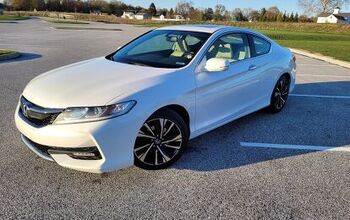The Finally Defunct Bugatti Veyron's U.S. Sales Run: By The Numbers
Finally. The Veyron is done.
Bugatti reportedly sold the last Veyron, a car which will be displayed at the Geneva auto show in March, to a customer in the Middle East.
Volkswagen-owned Bugatti’s 450-unit production run comes to a close after nearly a decade of delivering cars to customers. Although the cars routinely sold for more than $2M, Bloomberg referenced Singapore-based analyst Max Warburton who believes VW lost €4.6M per car, more than USD $5M.
Unlike the detailed sales reports we see each month from Volkswagen of America’s namesake brand, Veyron-specific numbers were never formally reported. Automotive News reports that approximately one-quarter, or 113, of the Bugatti Veyrons produced ended up in the United States.
It would be easy to rib Bugatti for its sales struggles. But rather than critique the French hypercar, let’s do ourselves the service of placing its numbers in context.
If there are 113 Bugatti Veyrons on America’s roads – or more likely, locked in hyperbaric, anechoic chambers – how do such figures align with the sales numbers (circa 2014) for the vehicles you drive?
671 – the number of seconds it takes for Americans to buy 113 SUVs and crossovers.
79 – the number of minutes it takes Ford to sell 113 F-Series pickups in America. Ford sold more than 2000 F-Series per day in 2014, a slightly slower year for the F-Series, America’s best-selling vehicle line.
9 – the number of hours Ford needed in the final two months of 2014 to sell 113 Mustangs.
5 – the number of days required for the Chevrolet Trax to find 113 new owners in its first month of availability, December, when a twin of the Trax, Buick’s Encore, had already been on sale for nearly two years.
1 – the number of days required for GMC to sell 113 Yukons. The Yukon is the third-best-selling nameplate off GM’s full-size SUV platform. On an average day in the U.S. in 2014, GM dealers sold 697 Escalades, Suburbans, Tahoes, Yukons, and Yukon XLs.
2 – the number of weeks required for Mercedes-Benz USA to sell 113 G-Class SUVs. At the moment, the G-Class has the highest base price of any SUV sold in the United States.
4925 – the number of minivans sold in America during calendar year 2014 for every Bugatti Veyron ever sold in America.
35,619 – the number of Toyota Camrys sold between 2005 and 2014 for every Veyron ever sold in America.
130 – the number of $845K+ Porsche 918 Spyders sold in the United States in its first eight months of availability.
51 – the number of miles one must drive from the Smart factory in Hambach, France – from which 10,453 Fortwos were shipped and sold in the United States in 2014 – to Molsheim, France, where the Veyron was assembled.
Timothy Cain is the founder of GoodCarBadCar.net, which obsesses over the free and frequent publication of U.S. and Canadian auto sales figures.
More by Timothy Cain
Latest Car Reviews
Read moreLatest Product Reviews
Read moreRecent Comments
- ToolGuy "The mechanics at my local shop in West Seattle are all wishing they had room in their driveways to buy it and they say it has a lot of life."• Here is how you know your mechanic really wants to buy your vehicle: Your mechanic buys your vehicle.
- ToolGuy I no longer listen to music while driving; I am all about the TTAC Podcast.
- ToolGuy I predict this will do well. (And the upgraded hybrids to follow will do even better.)
- Calrson Fan I predict this won't sell any better than the F150 Lightening. People with money to burn will buy it for the "hey look what I got" factor. They'll tire of it quickly once they have shown it to friends & family and then sell or trade in at a huge loss. It will be their first and last EV PU truck until the technology & charging infrastructure matures.
- Carson D There is a story going around that a man who bought a new Tundra was contacted by his insurance company because his son's phone had paired with his infotainment system, and the insurance company added his son to his policy as a result. If Toyota is cooperating with insurance companies, one might think that they're doing so in order to get lower rates for their vehicles as a selling feature. Spying on your customers and ratting them out to insurance companies is not a selling feature. I know of one sale that it has already cost them.


































Comments
Join the conversation
Could never get past the toilet bowl grill!.....LOL
Were these built to order, or was this like a 2010 model still sitting on the lot kind of thing?